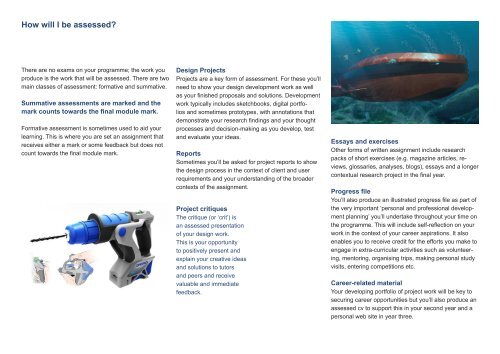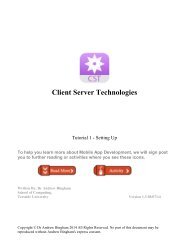15|16
Create successful ePaper yourself
Turn your PDF publications into a flip-book with our unique Google optimized e-Paper software.
How will I be assessed?<br />
There are no exams on your programme; the work you<br />
produce is the work that will be assessed. There are two<br />
main classes of assessment: formative and summative.<br />
Summative assessments are marked and the<br />
mark counts towards the final module mark.<br />
Formative assessment is sometimes used to aid your<br />
learning. This is where you are set an assignment that<br />
receives either a mark or some feedback but does not<br />
count towards the final module mark.<br />
Design Projects<br />
Projects are a key form of assessment. For these you’ll<br />
need to show your design development work as well<br />
as your finished proposals and solutions. Development<br />
work typically includes sketchbooks, digital portfolios<br />
and sometimes prototypes, with annotations that<br />
demonstrate your research findings and your thought<br />
processes and decision-making as you develop, test<br />
and evaluate your ideas.<br />
Reports<br />
Sometimes you’ll be asked for project reports to show<br />
the design process in the context of client and user<br />
requirements and your understanding of the broader<br />
contexts of the assignment.<br />
Project critiques<br />
The critique (or ‘crit’) is<br />
an assessed presentation<br />
of your design work.<br />
This is your opportunity<br />
to positively present and<br />
explain your creative ideas<br />
and solutions to tutors<br />
and peers and receive<br />
valuable and immediate<br />
feedback.<br />
Essays and exercises<br />
Other forms of written assignment include research<br />
packs of short exercises (e.g. magazine articles, reviews,<br />
glossaries, analyses, blogs), essays and a longer<br />
contextual research project in the final year.<br />
Progress file<br />
You’ll also produce an illustrated progress file as part of<br />
the very important ‘personal and professional development<br />
planning’ you’ll undertake throughout your time on<br />
the programme. This will include self-reflection on your<br />
work in the context of your career aspirations. It also<br />
enables you to receive credit for the efforts you make to<br />
engage in extra-curricular activities such as volunteering,<br />
mentoring, organising trips, making personal study<br />
visits, entering competitions etc.<br />
Career-related material<br />
Your developing portfolio of project work will be key to<br />
securing career opportunities but you’ll also produce an<br />
assessed cv to support this in your second year and a<br />
personal web site in year three.



